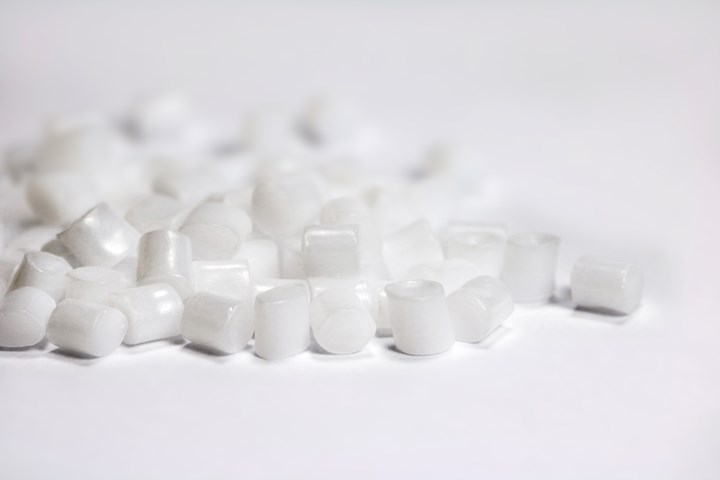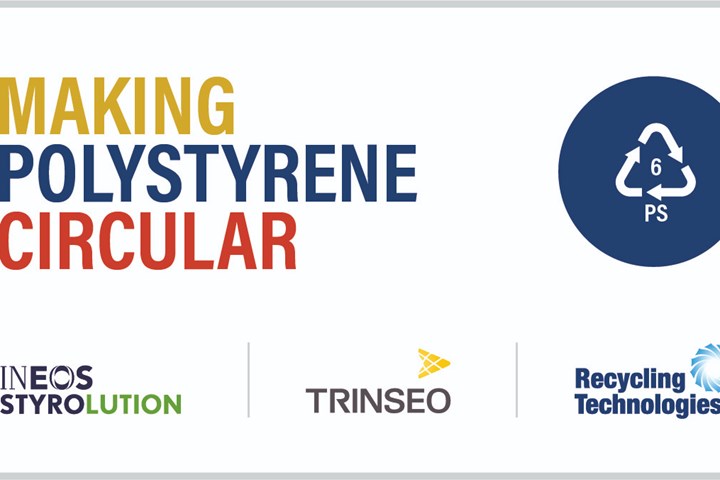Ineos Styrolution, Recycling Technologies and Trinseo Reach Milestone in Plans to Build Commercial PS Recycling Plants
Pilot plant to be built next year in the U.K. using Recycling Technologies’ depolymerization solution.
Germany’s (U.S. office Aurora, Ill.), Trinseo, Berwyn, Penn. and of the U.K., have reached a significant milestone in their plans to built commercial recycling plants in Europe that will use Recycling Technologies’ depolymerization process.
These three companies all share the same vision of making PS a circular material through depolymerization. The unique properties of PS reportedly allow for full circularity where PS waste is returned to its chemical building blocks before being polymerized again. Properties of the resultant recycled PS will be identical to those of virgin PS. Life cycle assessment calculations show significant decreases in greenhouse gas emissions when compared with PS production from naphtha.

Following a detailed assessment of technology options, Recycling Technologies was selected to join Ineos Styrolution and Trinseo as the technology provider for commercial scale recycling of PS. Recycling Technologies’ solution was shown to provie the highest yields in the conversion of PS to styrene monomer and to provide the most scalable solution due to the company’s fluidized bed reactor. This along with expertise of a highly skilled technical team.
Prior to building the commercial scale recycling plants, a PS recycling pilot plant will be built in the UK in 2022, and the technology will be further developed jointly by the three parties. The pilot plant will provide information and data related to chemical recycling and operations to support future development of the commercial scale recycling plants.
Ineos Styrolution plans to build its full commercial scale recycling facility in Wingles, France. Trinseo announces its plan to build its own plant in Tessenderlo, Belgium, which is expected to be operational in 2023. Each plant would aim to convert 15kT/y of PS waste into recycled styrene.
Said Sven Riechers, Ineos Styrolution v.p. 911±¬ÁÏÍø management, standard products EMEA, “Being the location of one of our polystyrene plants in Europe, Wingles is perfectly suited for our future recycling facility.”
Said Nicolas Joly, Trinseo’s v.p. for plastics & feedstocks and president of styrenics circular solutions, “Polystyrene turns out to be a wonderful polymer. Not only is depolymerization an effective recycling method, but it also allows for recycling while also maintaining food contact compliancy.”
Noted Adrian Griffiths, Recycling Technologies’ CEO & founder, “Our collaboration with Ineos Styrolution and Trinseo is a strong recognition of our technology’s ability to make polystyrene circular. We look forward to working with these two global leading companies to build Europe’s first chemical polystyrene recycling facility.”

Related Content
-
Let's Take a Journey into the World of Molding Thermosets – Part 1
There are many fundamental differences between thermosets and thermoplastics, from the way raw materials are furnished to the molder and the process in which parts are molded.
-
Polymer Science for Those Who Work With Plastic — Part 1: The Repeat Unit
What are the basic building blocks of plastics and how do they affect the processing of that material and its potential applications in the real world? Meet the repeat unit.
-
Part 3: The World of Molding Thermosets
Thermosets were the prevalent material in the early history of plastics, but were soon overtaken by thermoplastics in injection molding applications.





